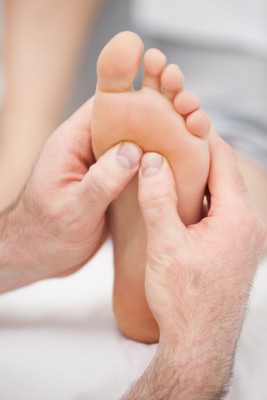 If your toes are numb, you’re not alone. Millions of people are affected by toe numbness, and the condition can make it difficult to run, walk or even stand. Today, we take a closer look at toe numbness, including what causes it, what symptoms accompany the condition and how to treat it.
If your toes are numb, you’re not alone. Millions of people are affected by toe numbness, and the condition can make it difficult to run, walk or even stand. Today, we take a closer look at toe numbness, including what causes it, what symptoms accompany the condition and how to treat it.
My Toes Are Numb
You’ve probably experienced numbness in your legs or your arms when you’ve slept on them wrong, and toe numbness is pretty similar. For some people, toe numbness is a temporary sensation, but for others it can be a chronic condition. Aside from numbness or a dulled sensation in your feet, some symptoms of toe numbness include:
- Tingling sensation in your toes, feet or legs
- Burning
- Pain
- A “pins and needles” feeling in your toes
- An abnormal sensation when walking
Because you have a lack of feeling in your toes, you may be more susceptible to injuries like cuts, sores or bruises. Toe numbness is a cause for a concern, but it’s rarely considered a medical emergency. If the problem doesn’t alleviate after a few hours or days, swing into your doctor’s office.
What Causes Toe Numbness?
As we’ve mentioned before, your feet are complex systems filled with sensory nerves. If these nerves become damaged, irritated or compressed, you could experience pain or a lack of sensation. Additionally, there are a number of medical conditions that can cause numbness or nerve damage, including:
- Diabetes
- Charcot-Marie-Tooth disease
- Frostbite
- Multiple Sclerosis
- Morton’s Neuroma
- Shingles
- Spinal Cord Injuries
- Blood Vessel Inflammation
Lastly, some people experience toe numbness during or after periods of activity, like running or other exercises. That’s because the nerves in your toes can get compressed while shouldering your body’s weight during exercise. This type of numbness generally subsides after a short while, and it should only be concerning if it lasts for days or is accompanied by significant pain.
Treatment of Toe Numbness
Treatment of toe numbness varies based on the underlying cause, but eating a healthy diet and increasing your physical activity are good starts. In order to determine what’s wrong, your doctor will preform a comphesive foot exam, and in some cases, he’ll order an MRI or CT scan. Once your doctor uncovers what’s causing your numbness, he or she could prescribe a number of treatment options, including physical therapy, pain medications, anti-inflammatory medications, and in extreme cases, a minor surgical procedure to relieve pressure on the affected nerves.
In rare cases, toe numbness can be a sign of a serious medical event. If the numbness feels like it’s moving up your body, you could be experiencing the beginning of a stroke or heart attack. If the numbness grows, or if it is accompanied by blurred vision, facial drooping, loss of balance, muscle weakness or difficulty speaking, call 911.
All in all, toe numbness is generally not something to be concerned with unless it lingers for days, becomes a chronic condition or is associated with any of the above severe symptoms.